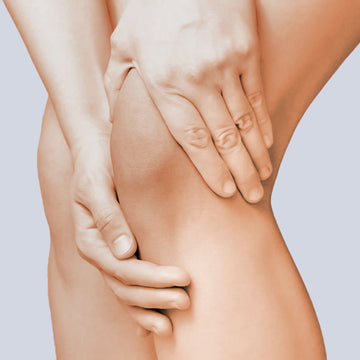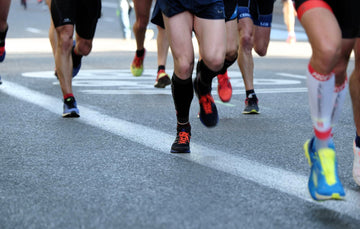Posted by Tia Patel | Feb-22-2021

Running whilst fasted
The question of when to run in the day has long been a topic of debate. Some choose to run when the sun rises, others during their lunchtime break or in the evening runner to de-stress from a long day's work.
Fasted running is a current nutritional trend along with the ketogenic diet and intermittent fasting. This includes running in the morning before having eaten breakfast to bring some great benefits to performance and in aiding weight loss. However, with all diets, particularly ones which involve movement, there are disadvantages too. So here’s everything you need to know about fasted running including what happens to your body.
What happens if you run whilst fasted?
Whilst you may worry that there is no fuel in your body to get you through a run first thing in the morning, on the sunny side, running fasted may bring some science backed health benefits.
To begin with, the body uses glucose stores from dinner the night before, so if you plan on running fasted, it's important to eat a hearty nutritious meal rich in protein and carbohydrates, the night before.
From improved competitive performance to positive changes in body composition to enhanced economy of movement, fasted running also enhances mitochondrial biogenesis and increases the number of mitochondria in the body. These are the batteries energising our muscles, so a greater number of mitochondria is one of the main adaptations we seek through training to improve our physiological potential.
All training has a positive impact, but to varying degrees. Fasted running has been shown to stimulate mitochondrial biogenesis more effectively than non-fasted running.
Additionally, fasted running improves our fat-burning potential – the ability to mobilise and convert fat for fuel, offering the potential to change body composition. At the same time, our regulation of insulin, the hormone which allows the mobilisation of carbohydrates for fuel, is improved, lowering our resting blood sugar levels.
Click here for our tips on losing weight without dieting
However, too much fasted running can hamper your carbohydrate metabolism, hindering performance at higher intensities. It can also prolong your recovery from exercise, effect immune function, reduce muscle mass and disrupt the menstrual cycle.
Our advice, save your fasting for your shorter runs and don’t attempt an endurance run without proper nutrition on board!
What are the benefits of fasted running?
1. Increased fat burning - The idea is that your body uses more fat as energy because your carbohydrate stores are low. The result is higher fat burn, or “oxidation.”
2. Reduced energy intake - Your body taps into your liver glycogen stores when your blood and muscle glycogen levels are depleted. According to the researchers, this affects your energy intake through the liver-brain neural network.
3. Might improve aerobic endurance - There’s some evidence that training on an empty stomach may increase aerobic endurance. In a small 2010 study fasted exercise was associated with higher VO₂ max. VO₂ max refers to your maximum oxygen uptake during intense physical activity. It’s a measurement of aerobic endurance and overall fitness.
4. Less digestion problems - During prolonged exercise, it’s common to experience digestive issues like: stomach or intestinal cramps, nausea, vomiting , diarrhea. These symptoms often affect athletes who run long distances or train for long periods of time.If you’re prone to exercise-induced digestive issues, running on an empty stomach might be ideal.
The disadvantages of fasted running
1. Reduced training intensity - Although your body can use fat for fuel, it’s not sustainable. When your fat stores fail to meet the demands of your run, fatigue will set in. This makes it difficult to maintain a high intensity or pace.
2. Injury risk - As your energy stores decline, you’re more likely to feel fatigued. Fatigue can increase your risk for injury during physical activity. Plus, your brain needs glucose to properly function. This is especially important during exercise, when your body is also using glucose to fuel your muscles. If you run fasted, your brain might not get enough energy, it may be difficult to practice proper form which can lead to injury.
3. Muscle loss - Cortisol is a hormone that your adrenal glands produce. It controls basic functions like blood glucose and the stress response. At high levels, cortisol promotes protein breakdown in muscle cells. This increases muscle loss and weakness. Your cortisol levels are highest in the early morning. This means running on an empty stomach, which is usually done in the morning, could negatively affect your muscles.
4. Risks for certain conditions- If you have type 1 or type 2 diabetes, running on an empty stomach might cause low blood sugar (hypoglycemia). You’re more likely to develop exercise-induced hypoglycemia if you take diabetes medications, like insulin. To stay safe, always check your blood sugar and eat a snack before running.
5. Ineffective for long-term weight loss - Although some research shows that fasted exercise increases fat burn, it may not be ideal for long-term weight loss. This is due to the way the body regulates its fuel source. When you burn high amounts of fat during a fasted run, your body compensates by reducing fat burn later on. It utilizes more glucose instead suggesting that working out fasted doesn’t cause significant changes in body composition.
Fasted running isn’t about skipping meals, it’s about planning meal times effectively to help your fitness goals so you can #RecoverBetter #PushHarder
Read our guide to post workout nutrition
#TeamGPD
















